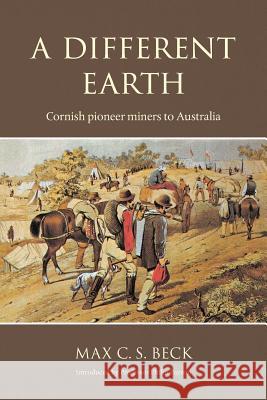A Different Earth » książka
A Different Earth
ISBN-13: 9781904880349 / Angielski / Miękka / 2016 / 394 str.
A heroic story of suffering, hope and survival. When the potato blight hits Cornwall in 1847, Jane Dunstan (born in Wendron in 1814) rescues her large family, first by the long suffocating passage to South Australia, then 100 miles by bullock wagon to Burra's copper mines and finally by a 350-mile trek to the goldfields of Victoria. On the threshold of starvation when the potato blight hits Cornwall, Jane Dunstan (born in Wendron in 1814) decides to rescue her family from desperate poverty and her husband, Richard, from the dreadful conditions in the mines. She successfully applies for a 'free passage' to migrate to South Australia with their seven children aged from one to twelve. After suffering appalling living conditions in the cramped steerage quarters of the ship and the challenges of the sea during the three-month journey the family, on arrival in South Australia in 1849, travel 100 miles north of Adelaide by bullock wagon to the Burra copper mines. At Burra they live in an underground dugout in the banks of the Burra Creek and Richard, with his three eldest boys, works in the mine. For Jane, it's a dramatic time, with floods, a new baby born underground and the tragic loss of her husband and two daughters. On the discovery of gold in Victoria in 1851, Jane hires a bullock dray and driver to take her remaining six children on a courageous six-week, 350-mile overland trek to the Victorian goldfields. The story describes the difficulties of locating and travelling the trail, the working and the idiosyncrasies of the bullock team and its driver, Red. Jane has to adapt to living in the bush, foraging for bush tucker and dealing with pests and hazards along the way. On arriving at the diggings Jane is horrified by what she sees but ultimately she remarries, has three more children, bringing her total issue to eleven, and eventually finds a measure of peace. A Different Earth is based on the experiences of the author's great-great grandparents, Richard and Jane Dunstan.
A heroic story of suffering, hope and survival. When the potato blight hits Cornwall in 1847, Jane Dunstan (born in Wendron in 1814) rescues her large family, first by the long suffocating passage to South Australia, then 100 miles by bullock wagon to Burras copper mines and finally by a 350-mile trek to the goldfields of Victoria. On the threshold of starvation when the potato blight hits Cornwall, Jane Dunstan (born in Wendron in 1814) decides to rescue her family from desperate poverty and her husband, Richard, from the dreadful conditions in the mines. She successfully applies for a free passage to migrate to South Australia with their seven children aged from one to twelve. After suffering appalling living conditions in the cramped steerage quarters of the ship and the challenges of the sea during the three-month journey the family, on arrival in South Australia in 1849, travel 100 miles north of Adelaide by bullock wagon to the Burra copper mines.At Burra they live in an underground dugout in the banks of the Burra Creek and Richard, with his three eldest boys, works in the mine. For Jane, its a dramatic time, with floods, a new baby born underground and the tragic loss of her husband and two daughters.On the discovery of gold in Victoria in 1851, Jane hires a bullock dray and driver to take her remaining six children on a courageous six-week, 350-mile overland trek to the Victorian goldfields. The story describes the difficulties of locating and travelling the trail, the working and the idiosyncrasies of the bullock team and its driver, Red. Jane has to adapt to living in the bush, foraging for bush tucker and dealing with pests and hazards along the way. On arriving at the diggings Jane is horrified by what she sees but ultimately she remarries, has three more children, bringing her total issue to eleven, and eventually finds a measure of peace.A Different Earth is based on the experiences of the authors great-great grandparents, Richard and Jane Dunstan.











